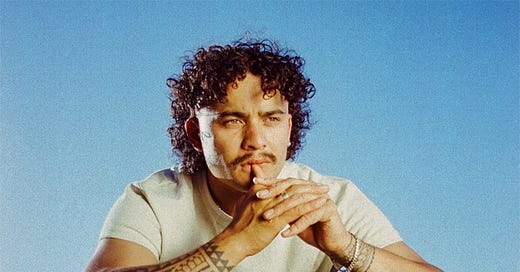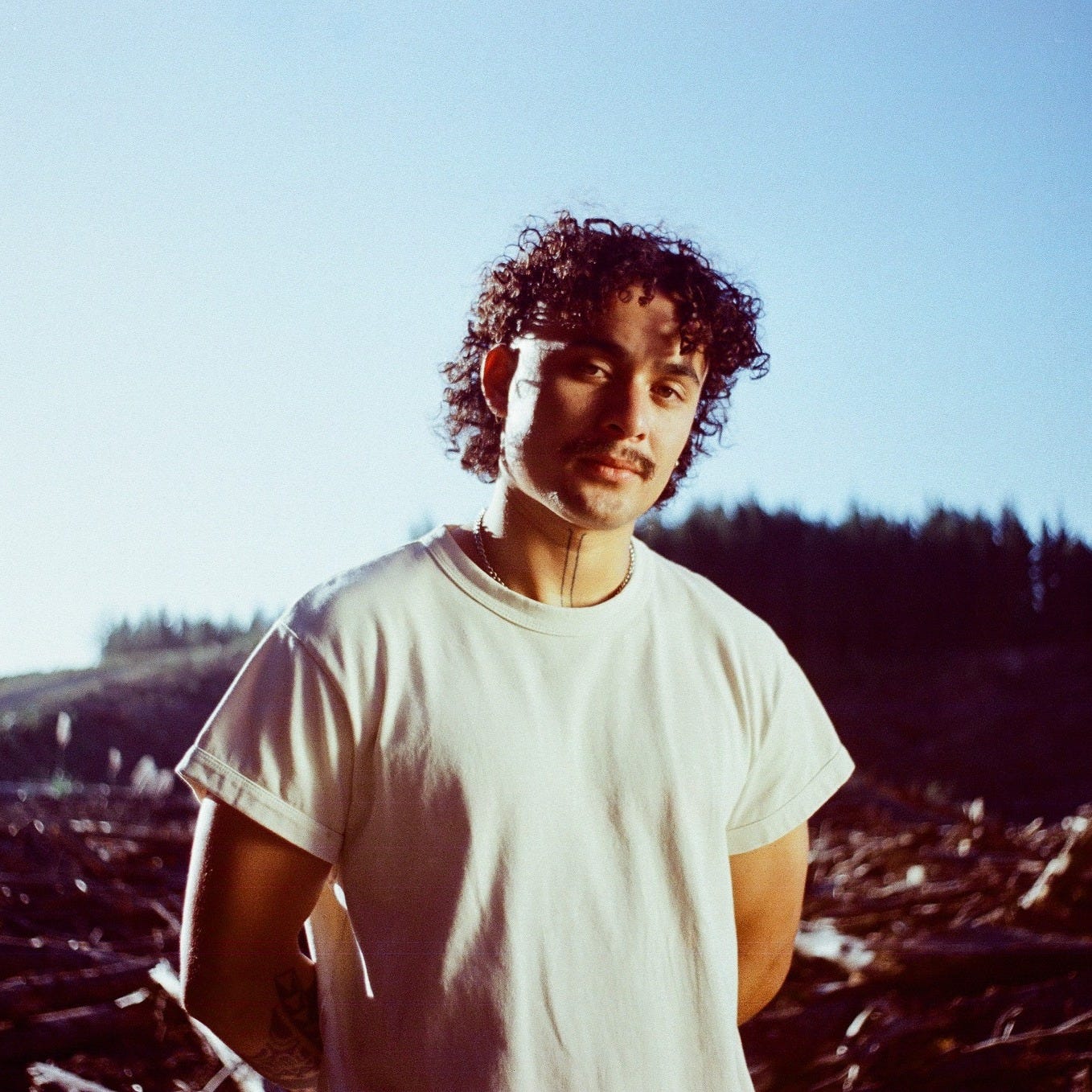An Interview with Reiki Ruawai - INTERVIEW
Reiki Ruawai discusses his life in Raglan, bringing Māori culture into his music, and being part of Ones To Watch 2024.
Reiki Ruawai sat down with us to tell us about his journey into music, hitting the surf in Raglan and hitting the stage at Ones To Watch. This interview was conducted prior to Ones To Watch, which featured Sam Cullen, CRYSTAL and Reiki Ruawai, for a showcase performance at Big Fan.
A. Tell me a bit about yourself. How did you get started on this journey?
R. My name is Reiki. I am a singer-songwriter, band player from Raglan. I kind of grew up being around music all my life. My parents were in a band, and they didn't force me to do anything. They had a lot of instruments around the house, and so I just naturally, gravitated towards music in general. Guitar was my first instrument. I guess it's actually my only instrument… I say that I can jam bass and drums and but I actually can't — those are just like fantasy fun moments.
R. I ended up getting into making music and putting out my own originals back in 2019, in a band called Masaya that was formed by myself, my sister who plays drums, and our other homie, Muroki, who plays bass. We were in that buzz for the summer and then we released our first EP at the end of 2019.
R. I released a couple other tunes under my own name — they were more on the R&B, souly vibe. I had plans to pursue both back then in 2019, but I guess Masaya took up most of my time, not in a bad way, but just like that was kind of my project at that stage, so I decided to focus all of my energy into that. We ended up releasing an album in 2022. Only last year, I kind of sparked up the soul of this [solo project] and came back to putting energy into that. It led me to put out more singles this year and an EP.
A. Growing up in Raglan, what do you think the creative scene looks like there?
R. It's very supportive. Definitely. I feel like there are so many musicians or artists in Raglan, all in their little nooks and crannies. And I reckon it's made Raglan such a supportive community towards any kind of art, whether it be music gigs or exhibitions. And now in my friend group, we have a lot of musicians and artists as well, and we're all kind of up and coming, them doing exhibitions, us doing gigs.
R. I guess the place itself gives off a you can do anything vibe, you know… if you really want to. The energy out here is very relaxed, I will say that. But it definitely gives you that space to do whatever as well. There's no real pressure from a job — people do work here, but especially Mondays and Tuesdays no one works. I went surfing this morning. And in fact, it was like everyone had a day off, and it was 10 o'clock on Monday. There were at least 50 people out in this one spot. I went and checked another spot, and there was like another 50 people. There's no real pressure — I feel like that kind of gives creatives that space to do what they want.
A. What’s your top tip, as a Raglan local, for people visiting?
R. You have to go and check out this Japanese spot called Ulo’s. It's a mean restaurant. I've never been to Japan. The setup is really nice — warm lighting and heaps of just cool shit. They usually have this fella called Cian, who spins vinyl there while you're eating the meanest sushi. They've got Ulo’s Kitchen, and then they have Ulo’s as a store. It's like their second hand vintage store/record store.
R. I guess, the beach. West Coast beach, so it’s quite rough, especially on the surf, but it is pretty I guess. The other one is definitely this place called Te Toto Gorge. We have a mountain, and it looks like a lady lying down, having a sleep, but at her feet, there's a mean lookout, and it's called to Te Toto Gorge. That's real pretty at sunset.
A. Bringing it back to music, who inspires you?
R. Growing up, I was listening to heaps of Freddy’s [Fat Freddy’s Drop], and a lot of Kiwiana 2000s reggae — so those bands like Katchafire, House of Shem, Salmonella Dub, they are all rooted into my music. What I listen to and what I really get into now is a bit of a mixed bag, so that's kind of why a bit of a hybrid style comes out. But people like Cowboy Malfoy, Anderson .Paak, D’Angelo, are a broad sound I try and hone in on.
A. What attracts you to those artists?
R. I guess the style of voice. Anderson .Paak has the most unique voice, I reckon. You can distinctively notice him always. And then, for melodies or harmonies as well, I think D’Angelo is crazy. Because I am a singer more than a lead guitarist or producer, I gravitate more towards vocals than anything else. Mk.gee — I froth over his music right now, him and Dijon. I'm actually going to his concert next month.
A. Oh, sick, you should ask him for a collab! If you were surveying the New Zealand music landscape at the moment, what's really standing out to you as the voice of New Zealand music right now?
R. I think people like Mokomokai, that have really put a big voice towards the Māori community. I love that stuff — to incorporate it in the actual music, they really put that at the forefront of their buzz, which is super dope. Nikau Te Huki, or Casual Healing. He's a good homie of mine as well. I love his new album, because it's probably the realest thing I've ever heard. He's just such an awesome human being, and I guess knowing him definitely makes the whole experience of listening to the album feel better, but he's another one who puts reo up there first for him, and he's very proud as well.
A. Is that something that you aspire to do more of? Because you have a song called Papatuānuku, is it your aspiration to bring more of your culture and your reo into your music?
R. When I wrote Papatuānuku, I didn't go out thinking that I was going to write a song in Māori. My Māori isn't the best and, even though it was my first language, I transferred over to a more mainstream school when I was year eight. I was having this buzzy conversation actually, the other day — I just did not know how to read English until year eight, and so I didn't pick up my first book until year eight. I didn't really know much English, so I felt like I had to put my Māori aside to focus on learning English and trying to, I guess at the time, be normal, you know… like, that was how I felt. But when I was writing Papatuānuku, I just gave it a go. I just started writing, finished it, then I gave it to my aunty to proofread. And she was like, that doesn't make sense. Well, we're here — let's do it together and make it make sense. But she understood where I was going with it, which was the main thing. That was kind of crack up — you always need that to humble you. And it's good if it's family, because they’ll just be like, cut that shit right now.
A. What does it mean to you to be selected for Ones To Watch?
R. It's kind of crack up being on a list that you should be watched. I'm real stoked, and I can't wait to jam. The whole buzz is kind of crack up to me. I definitely want to go out and smash it, because I want people to watch me.
A. What are you bringing to the performance? What should we expect?
R. The band is a full setup. I’m just trying to pick my best songs. I want to utilise the band as much as I can, because I've got a horn section, bass, drums and two guitars, including myself on rhythm. So I would definitely want to utilise that opportunity to push out my best sound and have fun with it. I love playing live. I'm glad that this is a live thing, doing showcases. I guess they're not long, but you don't get that opportunity often. I'm keen to put my best foot forward and smash it and go out fucking loud as and have a good time. That's kind of the main theme.
A. Do you dance quite a bit when you perform?
R. I definitely don’t dance, but I close my eyes and just lean back and fucking just get into it in pretending that no one's there, and I'm in my own world.
A. What gets you excited about being on this musical journey? What keeps you going?
R. Definitely trying to evolve every time I make something — trying to move forward, not necessarily in status, I just want to keep making music that people gravitate towards. I want my music to be forever evolving as well into a beautiful flower, and then back into a cocoon, and then we're back to a beautiful something else… that's definitely what gets me going, for sure.
A. How would you say you've evolved so far?
R. I think musically, I was never good at writing with other people, especially people that I don't know. Sessions scared the living shit out of me. I didn't think that I could really get into it. And so getting into sessions and writing these songs with different people, and getting that validation for ideas from other people was very encouraging. I feel like, from when I first released music, because I started off in a band, we would kind of work together and whatnot. But now it's evolved into me putting in the energy to say — no, I don't want that to happen, or I want that to happen. The other thing is, I didn't think that I would be writing the songs that I put out this year. The songs that I put out this year were a little bit on the pop side. It's just what happened in the studio and what flowed naturally, and so I was just running off that. My perspective has changed in that regard.
A. Last question — what’s next for Reiki Ruawai?
R. I used to live in Auckland for the last couple years, and then I moved back mid-September so that I could focus on writing an album. Definitely being back home, grounding myself, settling in, and then coming into the new year with new material and some tours. But for now, I'm at mum and dad's and making music, surfing and skating.
A. You’re really embodying Raglan!






